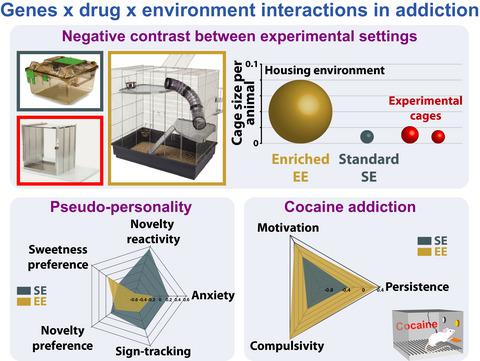当前位置:
X-MOL 学术
›
Eur. J. Nerosci.
›
论文详情
Our official English website, www.x-mol.net, welcomes your feedback! (Note: you will need to create a separate account there.)
Environment‐dependent behavioral traits and experiential factors shape addiction vulnerability
European Journal of Neroscience ( IF 3.4 ) Pub Date : 2020-12-17 , DOI: 10.1111/ejn.15087 Maxime Fouyssac 1 , Mickaël Puaud 1 , Eric Ducret 2 , Lucia Marti-Prats 1 , Nathalie Vanhille 3 , Solène Ansquer 3 , Xinxuan Zhang 1 , Aude Belin-Rauscent 1 , Chiara Giuliano 1 , Jean-Luc Houeto 3, 4 , Barry J Everitt 1 , David Belin 1
European Journal of Neroscience ( IF 3.4 ) Pub Date : 2020-12-17 , DOI: 10.1111/ejn.15087 Maxime Fouyssac 1 , Mickaël Puaud 1 , Eric Ducret 2 , Lucia Marti-Prats 1 , Nathalie Vanhille 3 , Solène Ansquer 3 , Xinxuan Zhang 1 , Aude Belin-Rauscent 1 , Chiara Giuliano 1 , Jean-Luc Houeto 3, 4 , Barry J Everitt 1 , David Belin 1
Affiliation

|
The transition from controlled drug use to drug addiction depends on an interaction between a vulnerable individual, their environment and a drug. Here we tested the hypothesis that conditions under which individuals live influence behavioral vulnerability traits and experiential factors operating in the drug taking environment to determine the vulnerability to addiction. The role of behavioral vulnerability traits in mediating the influence of housing conditions on the tendency to acquire cocaine self‐administration was characterized in 48 rats housed in either an enriched (EE) or a standard (SE) environment. Then, the influence of these housing conditions on the individual vulnerability to develop addiction‐like behavior for cocaine or alcohol was measured in 72 EE or SE rats after several months of cocaine self‐administration or intermittent alcohol drinking, respectively. The determining role of negative experiential factors in the drug taking context was further investigated in 48 SE rats that acquired alcohol drinking to self‐medicate distress in a schedule‐induced polydipsia procedure. The environment influenced the acquisition of drug intake through its effect on behavioral markers of resilience to addiction. In contrast, the initiation of drug taking as a coping strategy or in a negative state occasioned by the contrast between enriched housing conditions and a relatively impoverished drug taking setting, facilitated the development of compulsive cocaine and alcohol intake. These data indicate that addiction vulnerability depends on environmentally determined experiential factors, and suggest that initiating drug use through negative reinforcement‐based self‐medication facilitates the development of addiction in vulnerable individuals.
中文翻译:

依赖环境的行为特征和经验因素影响成瘾的脆弱性
从控制吸毒到吸毒成瘾的转变取决于弱势个体,他们的环境和毒品之间的相互作用。在这里,我们检验了以下假设,即个人所处的条件会影响行为脆弱性特征和在吸毒环境中起作用的经验因素,从而确定成瘾的脆弱性。行为脆弱性状在调节居住条件对获得可卡因自我管理倾向的影响中的作用已在48只饲养在丰富(EE)或标准(SE)环境中的大鼠中进行了表征。然后,在分别服用了几个月可卡因或连续饮酒几个月后,在72只EE或SE大鼠中测量了这些居住条件对个体产生可卡因或酒精成瘾行为的脆弱性的影响。消极经验因素在服药过程中的确定作用在48只SE大鼠中进行了进一步研究,这些大鼠通过日程诱发的多饮过程获得了饮酒以自我缓解药物困扰的能力。环境通过其对成瘾韧性的行为标志物的作用影响了药物摄入的获得。相比之下,由于住房条件充裕和相对贫困的吸毒环境之间的对比,开始采取吸毒作为应对策略或处于消极状态,促进了强迫性可卡因和酒精摄入的发展。这些数据表明,成瘾的脆弱性取决于环境决定的经验因素,并表明通过基于消极强化的自我药物治疗来开始吸毒可以促进脆弱人群的成瘾发展。
更新日期:2020-12-17
中文翻译:

依赖环境的行为特征和经验因素影响成瘾的脆弱性
从控制吸毒到吸毒成瘾的转变取决于弱势个体,他们的环境和毒品之间的相互作用。在这里,我们检验了以下假设,即个人所处的条件会影响行为脆弱性特征和在吸毒环境中起作用的经验因素,从而确定成瘾的脆弱性。行为脆弱性状在调节居住条件对获得可卡因自我管理倾向的影响中的作用已在48只饲养在丰富(EE)或标准(SE)环境中的大鼠中进行了表征。然后,在分别服用了几个月可卡因或连续饮酒几个月后,在72只EE或SE大鼠中测量了这些居住条件对个体产生可卡因或酒精成瘾行为的脆弱性的影响。消极经验因素在服药过程中的确定作用在48只SE大鼠中进行了进一步研究,这些大鼠通过日程诱发的多饮过程获得了饮酒以自我缓解药物困扰的能力。环境通过其对成瘾韧性的行为标志物的作用影响了药物摄入的获得。相比之下,由于住房条件充裕和相对贫困的吸毒环境之间的对比,开始采取吸毒作为应对策略或处于消极状态,促进了强迫性可卡因和酒精摄入的发展。这些数据表明,成瘾的脆弱性取决于环境决定的经验因素,并表明通过基于消极强化的自我药物治疗来开始吸毒可以促进脆弱人群的成瘾发展。


























 京公网安备 11010802027423号
京公网安备 11010802027423号